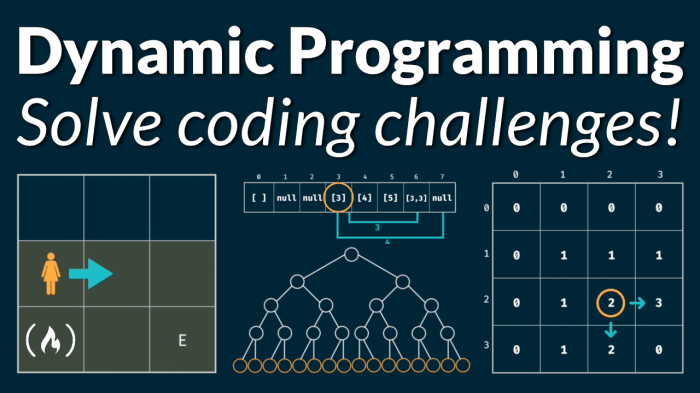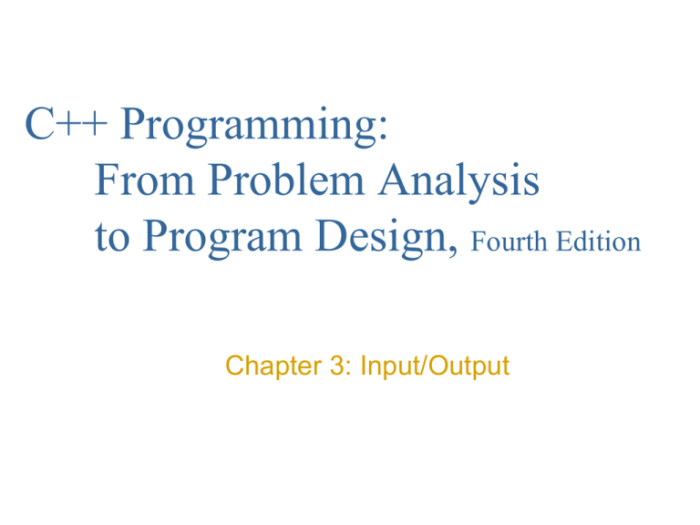C++ programming from problem analysis to program design pdf – Delve into the intricacies of C++ programming with our comprehensive guide, “C++ Programming: From Problem Analysis to Program Design (PDF).” This meticulously crafted document empowers you with the knowledge and skills to navigate the complexities of software development, unraveling the secrets of problem-solving and program design.
As you embark on this journey, you’ll uncover the fundamental principles of C++, exploring its features and advantages for tackling real-world challenges. Through a systematic approach, we’ll guide you through problem analysis techniques, program design patterns, and the implementation of efficient and maintainable code.
1. Introduction to C++ Programming
C++ is a powerful and versatile programming language widely used in software development. It combines the efficiency of a compiled language with the flexibility of an object-oriented language.
C++ offers numerous advantages for problem-solving, including:
- High performance due to its efficient memory management and low-level control
- Object-oriented design principles for code organization and maintainability
- Extensive library support for various tasks and domains
- Portability across multiple platforms and operating systems
2. Problem Analysis and Requirements Gathering: C++ Programming From Problem Analysis To Program Design Pdf

Understanding problem requirements is crucial for developing effective software solutions. Problem analysis involves identifying the problem’s scope, objectives, and constraints.
Techniques for gathering requirements include:
- Interviews and surveys with stakeholders
- Document analysis and review
- Use case analysis
Tools such as requirement management systems help document and manage requirements.
3. Program Design and Architecture
Program design involves structuring the code to meet the requirements and achieve the desired functionality. Principles of program design include:
- Modularity: Breaking down the program into smaller, independent modules
- Abstraction: Hiding implementation details and exposing only essential interfaces
- Coupling: Minimizing dependencies between modules for flexibility and maintainability
Design patterns provide reusable solutions for common programming problems, such as:
- Factory pattern: Creating objects without specifying the exact class
- Singleton pattern: Ensuring only one instance of a class exists
- Observer pattern: Notifying multiple objects about changes in a subject
4. Data Structures and Algorithms

Data structures organize data efficiently for storage and retrieval. Common data structures in C++ include:
- Arrays: Contiguous memory locations holding elements of the same type
- Linked lists: Collections of nodes connected through pointers
- Stacks: Last-in, first-out (LIFO) data structures
- Queues: First-in, first-out (FIFO) data structures
Algorithms are step-by-step procedures for solving computational problems. Their efficiency is measured by time and space complexity.
Examples of common algorithms include:
- Sorting algorithms: Bubble sort, quicksort, merge sort
- Searching algorithms: Linear search, binary search
- Graph algorithms: Dijkstra’s algorithm, breadth-first search
5. Code Implementation and Debugging
Code implementation involves translating the program design into executable code. Guidelines for efficient and readable code include:
- Proper indentation and spacing
- Descriptive variable and function names
- Appropriate use of comments
- Adherence to coding standards
Debugging involves identifying and fixing errors in the code. Techniques include:
- Using a debugger to step through the code
- Adding print statements to trace program execution
- Utilizing error handling mechanisms
6. Object-Oriented Programming Concepts
Object-oriented programming (OOP) organizes code into objects that encapsulate data and behavior.
Key OOP concepts include:
- Classes: Blueprints for creating objects
- Objects: Instances of classes with specific data and behavior
- Inheritance: Creating new classes from existing ones
- Polymorphism: Allowing objects to behave differently based on their class
OOP promotes code reusability, maintainability, and extensibility.
7. Advanced C++ Features
Advanced C++ features enhance the language’s capabilities and expressiveness.
These features include:
- Templates: Generic code that can be applied to different data types
- Generics: Creating generic classes and functions
- Exception handling: Managing errors and exceptions
These features enable efficient and robust code development.
8. Software Development Process
The software development process involves multiple phases, including:
- Requirements gathering and analysis
- Design and architecture
- Implementation and testing
- Deployment and maintenance
C++ plays a significant role in each phase, from implementing the design to testing and debugging.
9. Case Studies and Applications

C++ has been used in a wide range of applications, including:
- Operating systems (e.g., Windows, Linux)
- Embedded systems (e.g., automotive, medical devices)
- High-performance computing (e.g., scientific simulations, data analytics)
- Game development (e.g., Unreal Engine, Unity)
Case studies highlight the challenges and solutions encountered in these projects, demonstrating the practical use of C++ for problem-solving.
Helpful Answers
What is the significance of problem analysis in C++ programming?
Problem analysis is crucial as it allows you to thoroughly understand the problem at hand, ensuring that your program accurately addresses the user’s needs.
How can I improve the efficiency of my C++ code?
To enhance code efficiency, focus on optimizing algorithms, utilizing appropriate data structures, and employing techniques like code profiling to identify and address performance bottlenecks.
What are the benefits of object-oriented programming in C++?
Object-oriented programming promotes code reusability, maintainability, and extensibility, making it an effective approach for managing complex software projects.